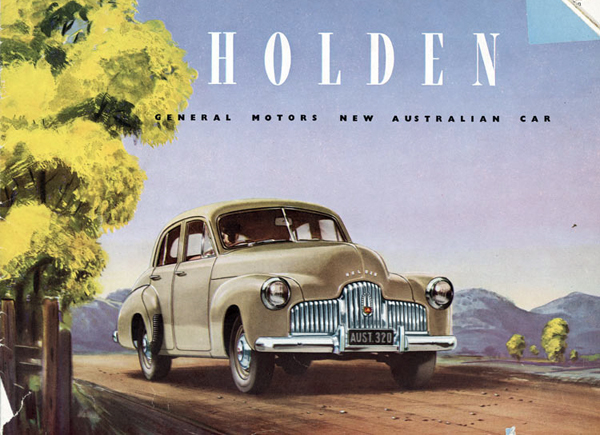The smalltalk of government and corporate leaders masks a potential crisis in the supply of liquid fuels in Australia. [6 March 2012 | Peter Boyer]

Fading memories: the first production Holden, over half a century old. IMAGE: NATIONAL LIBRARY OF AUSTRALIA
Tasmanians should be shielded from rising petrol prices, says RACT spokesman Vince Taskunas, who thinks retailers have kept the cost of this vital commodity artificially high.
His views about local retailers may be well-founded, but he’s doomed to be disappointed. As Meryl Naidoo reported in the Mercury last week, the world oil market is headed upward. This global trend is ultimately way beyond the capacity of Tasmanian retailers to absorb.
Knowing that no-one likes to pay more for petrol, the RACT no doubt feels it has to say these things to look after members’ interests. But it would be good if once in a while it put its collective mind to what’s happening out in the wider world to cause this financial discomfort.
After decades of denial by governments and oil corporations, in recent years both the Pentagon and the UK Energy Research Centre have said we’re entering a period of oil scarcity, a view echoed in warnings from the International Energy Agency and the International Monetary Fund.
What they were referring to was the phenomenon of “peak oil” — the point in time when the extraction of oil, a finite resource, reaches its maximum rate before beginning an inevitable decline.
A couple of significant scientific studies — including a paper in the prestigious journal Nature — have determined that peak oil is both real and a significant policy challenge for governments everywhere. Chinese scientists, for instance, have warned of dire consequences for China if it fails to prepare for the impact of peak oil.
There’s the rub: besides being a physical phenomenon, peak oil is also an economic issue. “Economic peak oil” is the point at which the cost of supply exceeds the price economies can pay without destroying growth.
Some economists say economic peak oil is a myth because high prices are an incentive to develop more expensive sources, such as oil from tar sands, shale and coal. Alan Kohler argued on the ABC’s “The Drum” last week that the great shale oil rush in the US was “the death of peak oil”.
This is a big claim. We know that extracting oil from Canada’s tar sands will lay waste to huge expanses of forested land. We’re now learning that shale oil extraction also has big environmental issues attached — and a much bigger carbon footprint than was first thought.
The environmental consequences of our desperate hunt for cheap energy should be uppermost in all our minds, but I have to be realistic here. The fact is they’re not. Much more pressing to most of us is the financial bottom line, which will finally determine the viability of alternative oil sources.
Kohler’s assessment assumes that that economies around the world, including our own, will always be strong enough to afford higher prices. I don’t think that’s a very safe bet.
A lot of unanswered questions continue to swirl around the issue of liquid fuel security despite several recent assessments, including a Tasmanian government one overdue for public release.
A big one is the impact on fuel security of the loss of nearly half Australia’s oil refining capacity with the projected closure of four refineries over the next couple of years. Shell and Exxon-Mobil have already announced closures, and Caltex is expected to announce two more later this year.
A report on Australia’s liquid fuel vulnerability drew attention late last year to a potential bottleneck in supply around 2014. This will be resolved only when new Asian refineries, with lower labour costs and greater economies of scale compared to their Australian counterparts, begin production from 2015.
The report, prepared by economic consultants ACIL Tasman for the National Energy Security Assessment, also found flaws in government petroleum data, such as double-counting of fuel stocks, which could create a false sense of security.
Like the RACT, governments appear blissfully unaware of supply concerns like these. Energy Minister Martin Ferguson’s reassurance that refinery closures are just a commercial matter flies in the face of industry assertions that fuel security demands a strong domestic refining capacity.
So often we hear these voices of “authority” appearing as an echo of the era when the family “big six” was all the go and regular discoveries of massive oilfields seemed to guarantee fuel supplies for centuries.
Australians beg to differ, and they’ve said so in the most effective way possible. In 2011, according to the Federal Chamber of Automotive Industries, car buyers turned massively away from six-cylinder icons of times past and opted for small, fuel-efficient cars.
The top-selling car model in Australia last year was the two-litre Mazda 3, edging out Australia’s long-time market leader, the 3.0L Holden Commodore.
Among the eight biggest-selling sedan models, sales of vehicles with 2.0L or smaller engines were three times those of the “Big Three”, Commodore, Camry and Falcon, whose sales were down by a whopping 20 per cent on 2010. One of them, Falcon, dropped by a third.
Let’s not get ahead of ourselves. Considering the energy involved in making and shipping new cars, replacing your old Holden Commodore with a brand new Mazda doesn’t do a lot for your carbon footprint.
But I prefer to see the glass half full. Our choice of smaller vehicles is a sign that something’s getting through.
